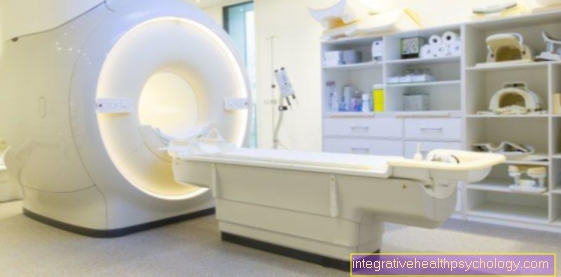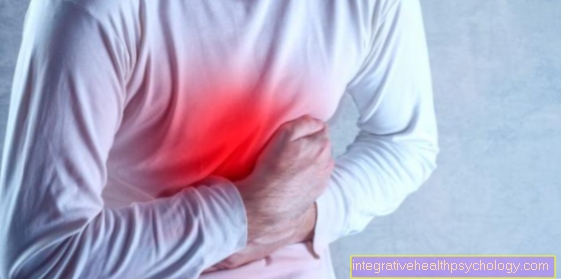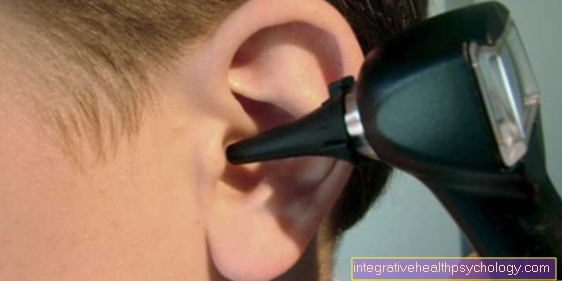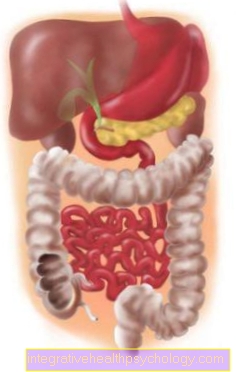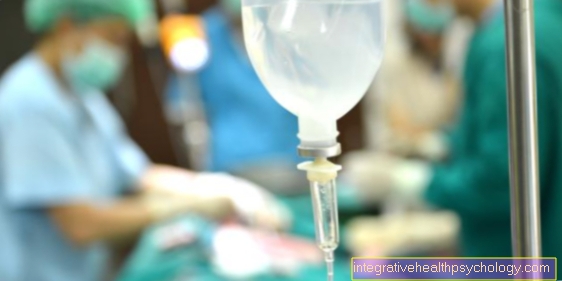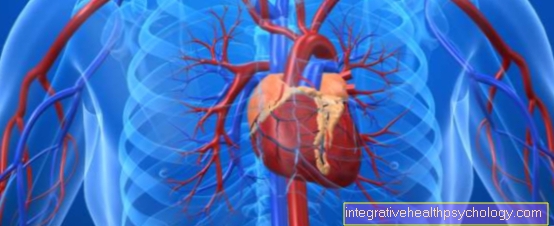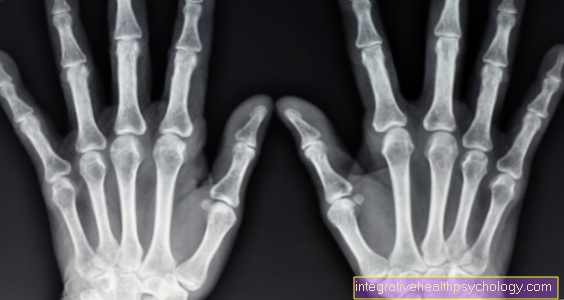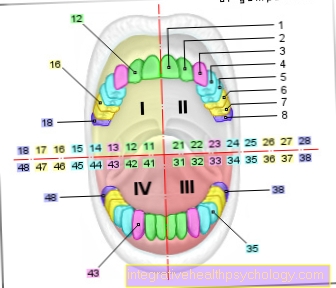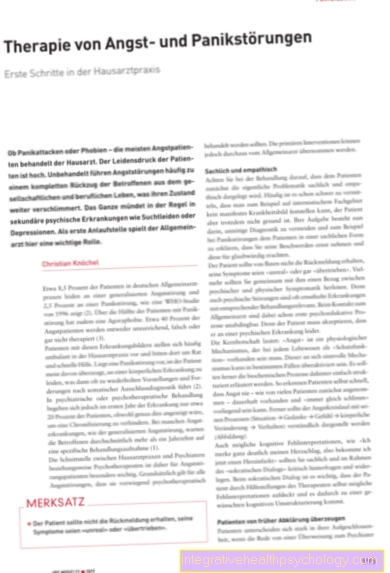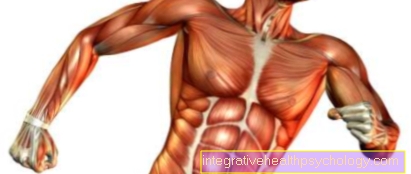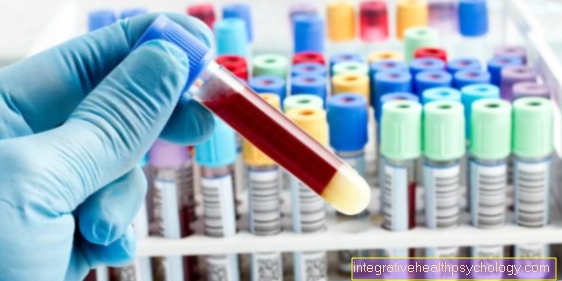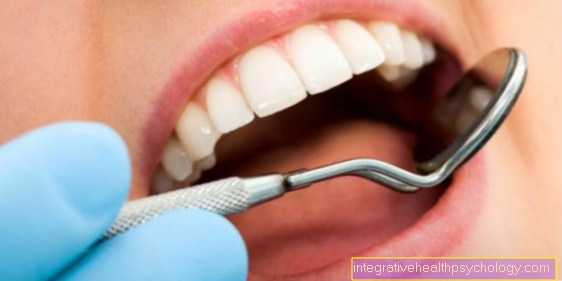Causes of atrial fibrillation
introduction
Whether you develop atrial fibrillation depends on various factors. The risk of the disease increases with age and affects around 1% of adults worldwide. There are some risk factors that can contribute to the development of atrial fibrillation. Some chronic conditions, such as long-standing high blood pressure (arterial hypertension), Heart disease, diabetes mellitus and thyroid dysfunction can negatively affect the development of atrial fibrillation.

causes
Causes of atrial fibrillation can be:
- high blood pressure
- Old age
- Heart disease (heart valve defect, heart muscle weakness)
- Diabetes mellitus
- Thyroid disease
- Lung diseases (e.g. chronic obstructive pulmonary disease (COPD))
- Sleep apnea syndrome
- Kidney disease
- stress
- Mental stress
- Alcohol consumption
- genetics
high blood pressure
High blood pressure (arterial hypertension) is a chronic disease that is often recognized late because it does not cause pain. This means that the increased blood pressure can stress the cardiovascular system over a long period of time. By definition, when blood pressure is measured, blood pressure is higher than 140/90 mmHg, with the normal value being 120/60 mmHg.
High blood pressure is one of the most common risk factors for atrial fibrillation. If there is arterial hypertension, the risk of developing atrial fibrillation increases by 1.5 times in men and 1.4 times in women. In paroxysmal atrial fibrillation (attack-like, recurring), hypertension is the main cause. The probability of developing atrial fibrillation in high blood pressure patients is 25 to 50%. High blood pressure is one of the most common causes of atrial fibrillation, but one that can be treated therapeutically.
Read more on the topic: Arrhythmias and high blood pressure
stress
It has long been known that psychological stress can damage the heart. Stress can be triggered by everyday stress such as noise or time pressure, pressure to perform or problems in the family. In stressful situations, our body activates the so-called vegetative nervous system and stress hormones are released. The blood pressure rises and the heartbeat speeds up. After coping with a stressful situation, the body functions normalize again and you relax. If stress levels persist for a long time and are repeated frequently, an imbalance between tension and relaxation arises. The heart is stressed and the vessels are permanently damaged.
Chronic stress can cause high blood pressure, increased blood lipids and deposits in the blood vessels (arteriosclerosis) cause. In the long term, cardiac arrhythmias such as atrial fibrillation can develop and have serious consequences such as a heart attack or stroke.
Stress is a cause of atrial fibrillation, which can be avoided by making healthy changes to your lifestyle, avoiding stressful situations and, if necessary, taking medication if the cardiovascular system is already damaged.
You might also be interested in: Consequences of cardiac arrhythmias
alcohol
Even moderate alcohol consumption increases the risk of developing atrial fibrillation. The higher the alcohol level, the higher the risk of cardiac arrhythmias. When we drink alcohol, it leads to various processes in our body and cardiovascular system. The alcohol causes the vessels to widen, which means that our blood "sinks" in the vessels and there is a drop in blood pressure. This explains the often reddened cheeks when consuming alcohol.
Despite the drop in blood pressure, alcohol consumption leads to an increased excretion of water: it is well known that those who drink beer have to go to the toilet more often. The body reacts to the drop in blood pressure and water loss by activating the sympathetic nervous system. Hormones are released that raise blood pressure and increase heart rate. The heart is stressed with regular alcohol consumption, cardiac arrhythmias up to atrial fibrillation can occur and in the long term even the blood pressure rises (compensatory).
Read more on the topic: Palpitations after alcohol - is that dangerous?
Mental causes
It is known that there is a connection between the occurrence of atrial fibrillation and psychological causes. Many patients, especially those with paroxysmal atrial fibrillation, have depression, sleep disorders and little exercise.
Psychological causes can cause mild cardiac arrhythmias up to atrial fibrillation. It is important to talk to the cardiologist about psychological stress in order to treat the disease in a targeted manner.
You might also be interested in: Therapy of atrial fibrillation
Old age
Atrial fibrillation is a cardiac arrhythmia that occurs more frequently with increasing age. Around one in four people over the age of 40 will develop atrial fibrillation in their lifetime and around 10% of those over 80 will have atrial fibrillation.
One percent of adults worldwide are affected by the disease. Old age is a serious risk factor for atrial fibrillation.
Coronary heart disease
In coronary artery disease (CHD) the coronary arteries, which supply the heart muscle with oxygen, are partly due to illness no longer able to supply the heart with sufficient amounts of oxygen.
This can interfere with the spread of electrical excitation in the heart tissue, which is responsible for the rhythmic contraction and pumping of the heart muscle. This means that coronary artery disease can cause irregular heartbeat such as atrial fibrillation. CHD-related atrial fibrillation occurs when the heart muscle cells in the atria are no longer able to pump synchronously.
Read more on the topic: Coronary heart disease
Valvular heart disease
Heart valve defects often go undetected for a long time and can have different symptoms, depending on the heart valve and the type of defect. Different symptoms can occur because the heart's performance is impaired in the long term, for example shortness of breath, fatigue and cardiac arrhythmias.
Since cardiac arrhythmias such as atrial fibrillation can have various causes, a thorough cardiological examination is necessary in order to identify the heart valve defects and treat them accordingly.
You might also be interested in the topic: Diseases of the heart
Cardiomyopathy
The term cardiomyopathy describes diseases of the Myocards, i.e. the heart muscles that are associated with a mechanical or electrophysiological dysfunction of the heart.
In addition to complaints such as shortness of breath, chest pain and dizziness, cardiac arrhythmias up to atrial fibrillation can occur. Cardiomyopathy that affects electrophysiology can cause atrial fibrillation.
Read more on the topic: Cardiomyopathy
Heart failure
In the case of cardiac muscle weakness, also known as cardiac insufficiency or cardiac insufficiency, the heart's pumping capacity is lower than in healthy people. The disease is often insidious and gradually the pumping power is less than enough to transport the oxygen-rich blood to the organs.
If heart muscle weakness is not treated, complications can arise and the heart muscle weakness can "decompensate". This can lead to a state of shock with a drop in blood pressure and cardiac arrhythmias such as atrial fibrillation.
Read more on the topic: Heart failure
Hyperthyroidism
An overactive thyroid (Hyperthyroidism) accelerates the entire metabolism and increases blood pressure and heart rate. Symptoms in the cardiovascular system can:
- a fast pulse or palpitations
- Cardiac arrhythmias
- High blood pressure (hypertension)
be.
The cardiac arrhythmias often express themselves as atrial fibrillation and Sinus tachycardias.
If left untreated, pronounced hyperthyroidism can lead to dangerous complications with a strongly accelerated pulse (Tachycardia) to coma and circulatory failure. Sudden reduced blood flow to the brain and strokes can be life-threatening. In order to avoid arrhythmias such as atrial fibrillation and complications such as strokes, it is necessary to treat thyroid dysfunction in a targeted manner and to regulate it correctly with medication.
Read more on the topic: Hyperthyroidism
Is there also atrial fibrillation without a cause?
Atrial fibrillation can occur without an identifiable cause; it is called idiopathic or primary atrial fibrillation. Around 15 to 30% of people who have atrial fibrillation have atrial fibrillation with no demonstrable cause.
Those affected have healthy hearts and there is no demonstrable cardiac cause for the arrhythmia.



